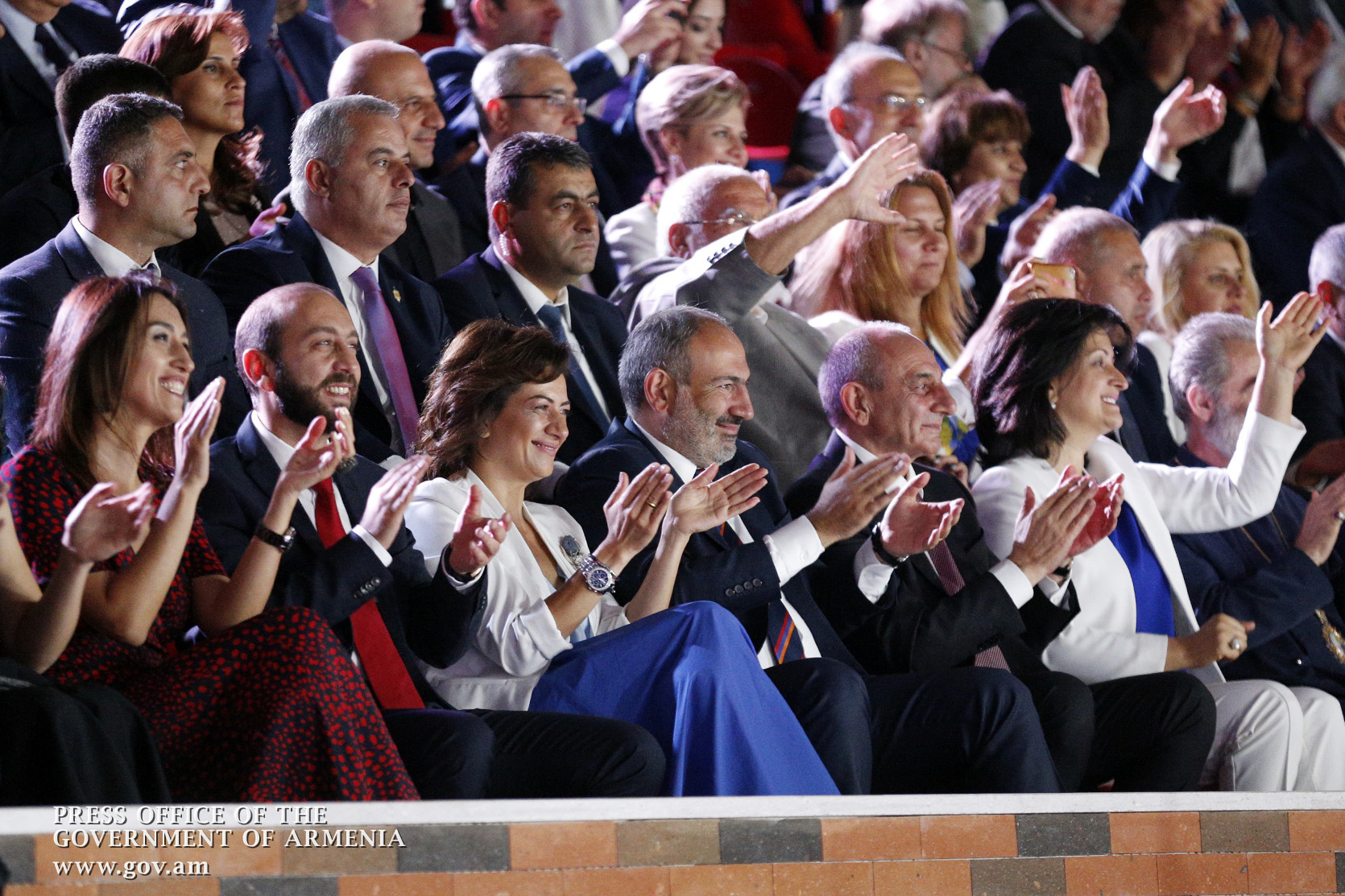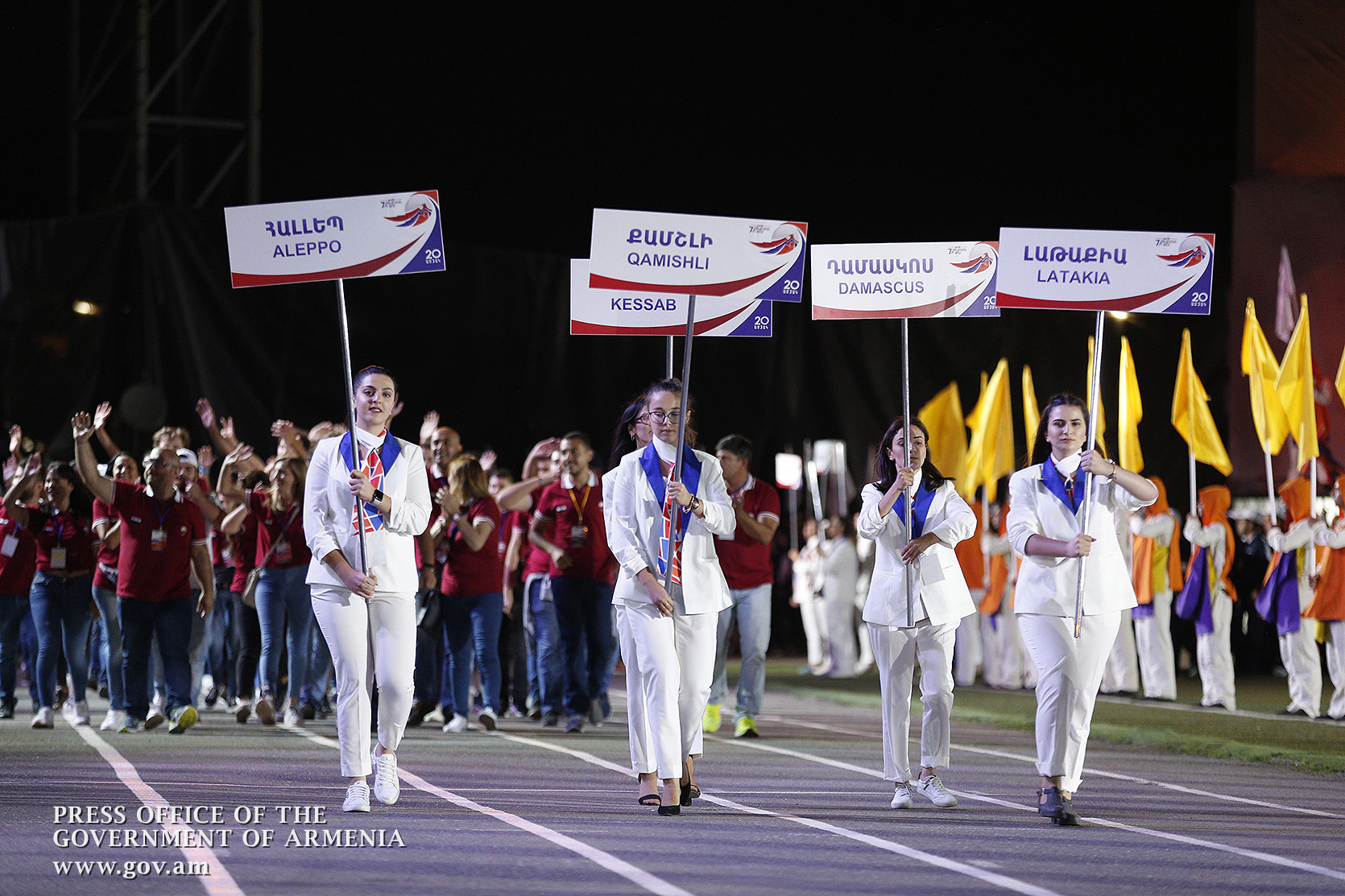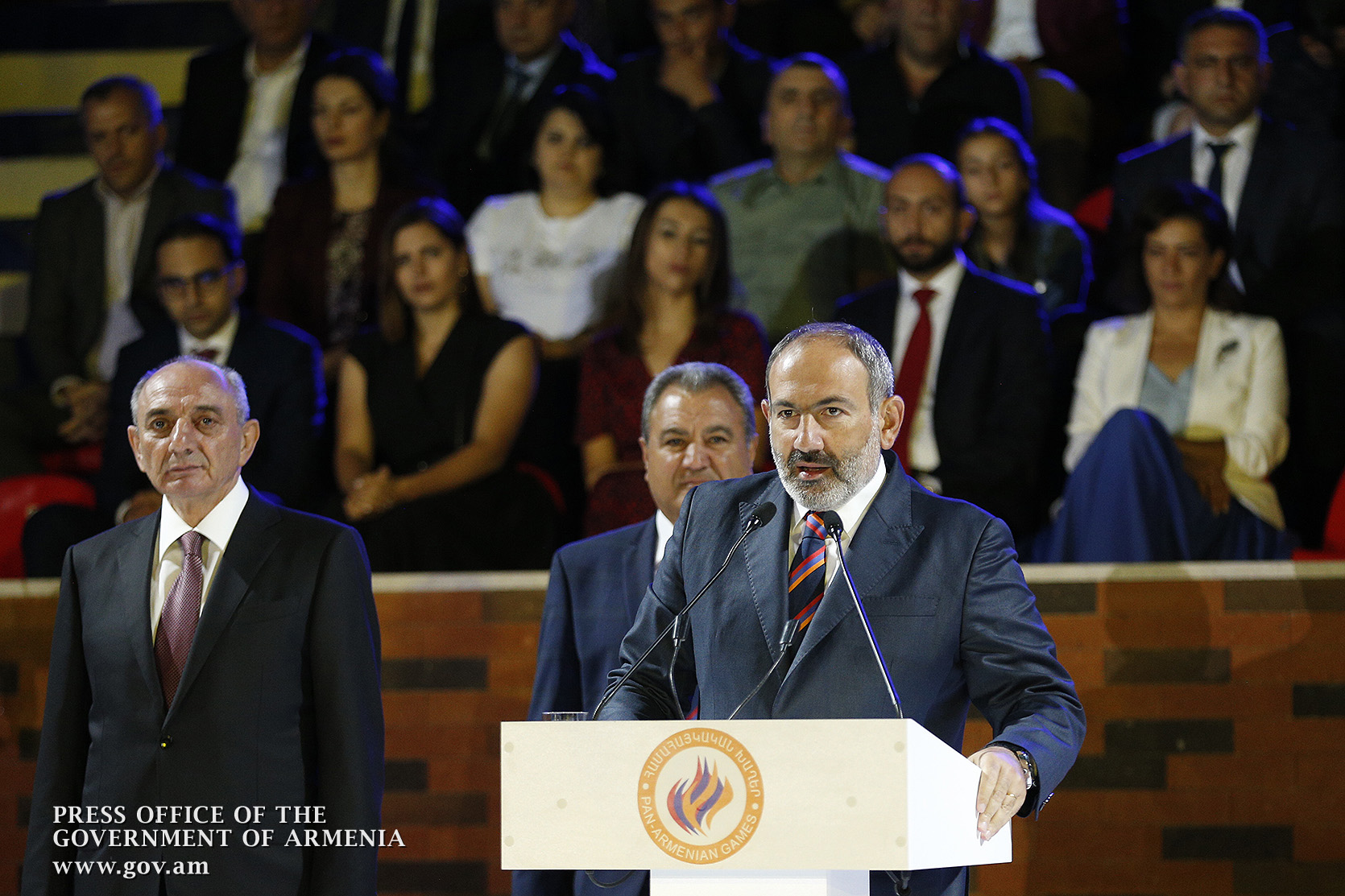
STEPANAKERT—A historic ceremony marked the official opening of the 2019 Pan-Armenian Games in Stepanakert on Monday evening. Celebrations continued on Independence Square as the Republic of Artsakh received such a high-profile event for the first time. The event also coincided with the twentieth anniversary of the Pan-Armenian Games.
Aside from the Opening Ceremony, Artsakh is also hosting five of the 17 sporting events scheduled for the first three days of the tournament. These are happening in the towns of Askeran, Martakert and Martuni respectively. The other 12 will take place in Yerevan. The 17 disciplines are arm wrestling, athletics, badminton, basketball, golf, handball, swimming, beach volleyball, volleyball, chess (this is Armenia after all), table tennis, cycling, sports, dancing, soccer, indoor soccer and target shooting.
According to Deputy Prime Minister Tigran Avinyan, 3500 athletes are participating in this year’s Pan-Armenian Games. They hail from 161 Armenian Diaspora communities spread across 35 countries. Russia has sent the largest delegation with 368 athletes representing 14 Russian cities. The United States, meanwhile, fielded its largest team to date: 318 athletes.
Notably, for the first time this year, teams from Iraq, the United Arab Emirates and Czechia are competing. The addition of new teams will only partially make up for the absence of Turkey’s Armenian community for the first time ever. Haykaram Karasu, who represents Istanbul at the Pan-Armenian Games Regulatory Commission, announced the decision to pull out of the event only days before the Opening. According to the Istanbul-based Armenian newspaper Jamanak, he cited the Olympiad’s setting in Artsakh as the main reason. The Turkish government is a vocal supporter of Azerbaijan’s claim over the Nagorno-Karabakh settlement issue. Karasu argued that his delegation, comprised mostly of Turkish citizens, might face difficulties from Turkish authorities for traveling there. Istanbul has participated in previous Games held within the internationally recognized borders of Armenia since 1999.
The decision to hold the games in Stepanakert was made three years ago in response to the short four-day war in April 2016. Speaking at the Opening Ceremony of the seventh Pan-Armenian Games on Monday evening, Artsakh President Bako Sahakyan justified the move as using sports to respond to Baku’s violence and aggression. “Embodying strength, willpower, organization and unity, sports is at the same time the antithesis of hatred and hostility. It recognizes no borders and discrimination, unites different nations and countries,” he declared. “Sports is another impetus cementing the Armenia-Artsakh-Diaspora trinity.”
Turkey’s Armenian community was not alone in its frustration at the Games’ chosen host-city. Tural Ganjaliyev, the self-titled “Representative of Nagorno-Karabakh’s Azeri community” vowed that Azerbaijan would keep a close eye on the game and its participants. He warned that attendees would find their names on the Azeri Foreign Ministry’s infamous List of Undesirable Persons. Ganjaliyev seemed especially inflamed by a declaration made by Armenian Prime Minister Nikol Pashinyan that “Artsakh is Armenia.”
Baku’s official response to the Games echoed that of Ganjaliyev. “Nagorno-Karabakh is Azerbaijan. It is our historic and inseparable land,” said Hikmet Haciyev of the Azeri President’s Office. Haciyev concluded his statement with a threat to invade the small republic.
Bellicose language from the Caspian Sea coast has done little to dissuade other international organizations from choosing Stepanakert as a venue. In June the Confederation of Independent Football Associations (CONIFA) discarded Baku’s loud objections to organize a FIFA World Cup-like soccer tournament for unrecognized countries in Artsakh. “Today the capital of Europe is Stepanakert,” CONIFA President Per-Anders Blind said of the tournament at the time.
Prime Minister Pashinyan’s bold opening remarks didn’t go unnoticed at home either. Supporters of the previous Republican-led government have long accused Pashinyan of being soft on the Artsakh issue. As Prime Minister, he has confused some by both calling for a negotiated settlement, while also appearing to take a hard stance on the matter. In the context of a recently-resolved public spat between Yerevan and Stepanakert, some observers have interpreted the Prime Minister’s statement as a public affirmation of solidarity for the cause of Artsakh’s independence.
The Prime Minister’s controversial quip about Artsakh was little more than a throw-away line in a speech that mostly focused on internal matters. In line with the Pan-Armenian Games’ motto of “unity through sports” Pashinyan emphasized the need to consolidate the strengths of the Armenian nation’s three constituent entities: Armenia, Artsakh and the Diaspora. Throughout his oration, Pashinyan argued that the Armenian people must abandon regional or political identities and get on the same page. “We must stop thinking of ourselves as Gharabaghtsis, Gyumertsis or Ijevantsis, but as Armenians,” he declared. Only through unity could Armenia survive the challenges it faces. Pashinyan then laid out the challenge ahead. He pledged to stimulate population growth, encourage high-value job creation in an innovative technology-driven economy, a seven-fold increase in salaries, investments in health and education, as well as improving the military’s combat readiness among other things.

During the three and a half-hour-long ceremony, Pan-Armenian Games World Committee Chairman Ishkhan Zakaryan introduced committee members, welcomed a procession of international delegations and congratulated those present for attending a historic event. The occasion of the Pan-Armenian Games also provided a platform to discuss some of the shortcomings in Armenia’s sporting infrastructure.
The Pan-Armenian Games were the brainchild of Soviet-Armenian diplomat Ashot Melik-Shahnazaryan. Having attended the 1965 Pan-African games in Brazzaville, Congo by chance, he imagined a similar contest which would unite Armenia’s disparate diaspora communities through sports. Shot down by Soviet authorities for promoting ethnic nationalism (an antithetical concept for the Soviets) Melik-Shahnazaryan waited until Armenia’s independence in 1991 to implement his vision. During a visit to an AGBU sporting event in Paris in 1995, he announced his intention to create a pan-Armenian olympiad. This call was met with great international enthusiasm, leading to the 1997 creation of the World Committee of Pan-Armenian Games (WCPAG) in Yerevan, of which he became chairman. He also inaugurated the first such games in Armenia in August 1999, which featured seven athletic disciplines. The roster would grow to 17 sporting events over the following 20 years. Yerevan hosted the first Pan-Armenian Winter Games in 2014.
While some of the athletes who traveled from the far corners of the globe may have grumbled at the thought of driving an extra five hours to the Opening Ceremony in Stepanakert, most have welcomed the idea. For Yerevan’s nightclub owners and restaurateurs, however, the next three days will be tough to wait through.



Hey Raffi:
Can you provide a video link to the opening ceremonies? Thanks. I will be in Armenia in Septemebr hopefully, would love to meet up.
The opening ceremonies in Stepanakert. Just sit back and enjoy, 3:43 hrs long
https://youtu.be/hso7GHKHXXw
hi, how numer of iranian athlets? also results and medal table?